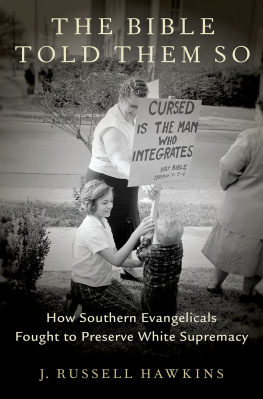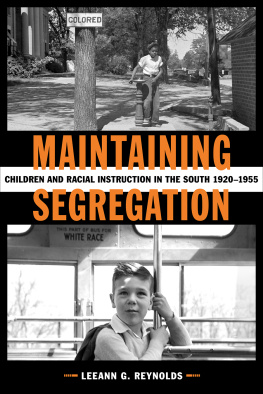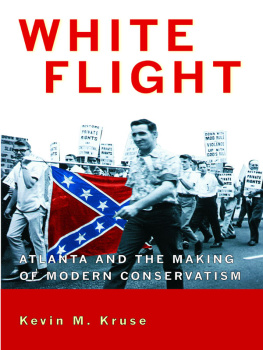This book was published with the assistance of the Thornton H. Brooks Fund of the University of North Carolina Press.
2011 The University of North Carolina Press
All rights reserved
Manufactured in the United States of America
Set in Arnhem and TheSerif types
by Tseng Information Systems, Inc.
The paper in this book meets the guidelines for permanence and durability of the Committee on Production Guidelines for Book Longevity of the Council on Library Resources.
The University of North Carolina Press has been a member of the Green Press Initiative since 2003.
Library of Congress Cataloging-in-Publication Data
Ward, Jason Morgan.
Defending white democracy : the making of a segregationist movement and the remaking
of racial politics, 19361965 / Jason Morgan Ward.
p. cm.
Includes bibliographical references and index.
ISBN 978-0-8078-3513-5 (hardback)
1. SegregationSouthern StatesHistory20th century. 2. SegregationPolitical aspectsSouthern StatesHistory20th century. 3. Southern StatesRace relations History20th century. 4. Southern StatesRace relationsPolitical aspectsHistory 20th century. 5. WhitesSouthern StatesPolitics and government20th century. 6. WhitesSouthern StatesAttitudesHistory20th century. 7. African Americans SegregationSouthern StatesHistory. 8. Civil rightsSouthern StatesHistory20th century. 9. Government, Resistance toSouthern StatesHistory20th century. I. Title.
F220.A1W37 2011
305.800975dc22 2011015513
15 14 13 12 11 5 4 3 2 1
ILLUSTRATIONS
Mock grave for Eugene Talmadge, 1936 /
Eugene Talmadge campaign literature, 1942 /
Postcard sent to Mississippi senator Theodore Bilbo by African American soldiers in Italy, 1942 /
Anti-Roosevelt pamphlet, 1944 /
Klan rally in Denmark, South Carolina, 1949 /
Flier promoting amendment to remove the constitutional provision for public schools in South Carolina, 1952 /
South Carolinians for Eisenhower campaign flier, 1952 /
Cartoon from the Citizens Council, August 1960 /
Cartoon from the Citizens Council, June 1960 /
ACKNOWLEDGMENTS
Peter Jocys taught U.S. history from the last chapter backwards so that his students at South Granville High School would finally make it past the Civil War. I have been stuck in the twentieth century ever since. Down the road from Creedmoor, I spent as much time as possible in the embarrassment of riches that is the Duke History Department. John Herd Thompson, Raymond Gavins, Sydney Nathans, Charles Payne, Larry Goodwyn, and Kristen Neuschel taught me to think and write like a historian. Paul Ortiz and Wayne Lee, two freshly minted Duke Ph.D.s, showed me how to put together a research project in their seminars. Bob Korstad and Bill Chafe took time from their duties elsewhere on campus to offer encouragement. John Hope Franklin graciously took me to lunch and listened to me yammer on about my senior thesis. My good fortune astounds me more each day.
The history faculty at Yale provided sage advice and steady encouragement from the day I arrived in New Haven. The first professor I met, Jon Butler, also taught my first class and always took time to share his peerless good sense. David Blights example as a teacher and scholar remains an inspiration. John Demoss zero-tolerance policy for gratuitous alliteration made me a better writer. John Mack Faragher not only allowed me to write a southern history paper in his U.S. West research seminar, but also kept after me until I finally submitted it to a journal. Stephen Pitti taught me twice and scared up timely research support through Yales Program on Ethnicity, Race, and Migration.
Well before this book project took shape, Beverly Gage challenged me to push beyond my regional focus and never slack off on my writing. Generous, insightful, and razor sharp, Bev is the best thing to happen to the Yale History Department in a good while. When I was not meeting with Bev, I was distracting Jonathan Holloway from his many duties at Calhoun College. Jonathan has provided unflagging encouragement and a steady stream of good counsel as I made my way from New Haven to Mississippi. No one has left a greater mark on this book than Glenda Gilmore, but it pales in comparison to her impact on my thinking, my teaching, and my life. Her vision shaped this project before I even knew what it was about, and I am profoundly grateful for her patience, wisdom, and advocacy on my behalf.
When I arrived in New Haven, Kat Charron, Aaron Wong, Franoise Hamlin, and Adriane Lentz-Smith looked after me. The Yall University Southern History crowdespecially Robin Morris, Sam Schaffer, Steve Prince, and Julie Weisecontinue to make New Haven, Connecticut, a hotbed of Dixie-ology. A few years after I inherited her old room on Mansfield Street, Tammy Ingram hosted me during multiple research trips. Bill Rando gave me a great job, and Yvette Barnards quick thinking helped me get my current one. In ways big and small, Eden Knudsen, Grace Leslie, Caitlin Casey, Julia Irwin, David Huyssen, Brenda Santos, Dana Schaffer, Sarah Haley, Sarah Hammond, Kamil Redmond, Rebecca McKenna, Julia Guarneri, and Kathryn Gin left their mark on my life and work in New Haven. I thank them all.
I received generous and timely support from various archives and institutions. The Joel Williamson Visiting Scholar Grant from the Southern Historical Collection at the University of North Carolina, the Elison Durant Smith Research Award from the South Caroliniana Library, and a research grant from the Institute for Southern Studies at the University of South Carolina allowed me to plumb remarkable repositories and enrich my project. More recently, the Mississippi State University Department of History provided course relief and research funds that accelerated the publication process. My department head, Alan Marcus, made this book a priority, and Pam Wasson, Patsy Humphrey, and Lonna Reinecke have helped me juggle its completion with various other duties. I am lucky to work with brilliant and collegial historians on a daily basis. Expect big things.
Talented folks who did not know me from Adam nonetheless lent their time and insight. Claire Potter, Joseph Lowndes, John Dittmer, David Chappell, Jane Dailey, and several anonymous readers shared advice that stuck. Charles Eagles read a draft cover to cover and whipped the prose into shape. Kevin Kruse signed on as an honorary reader and offered a timely critique. The term reader is a poor measure of Joe Crespinos mark on this manuscriptthe road map that he provided has guided me through many rounds of revision. David Perrys decision to put the manuscript in Joes capable hands was the first of many smart moves, and I could not have asked for more from an editor. David and everyone at the University of North Carolina Press make book publishing look easy. I could not have been in better hands.
My family made this undertaking possible. On my first trip to an archive, I thumbed through crumbling newspapers for twenty dollars and lunch. My employer that day, Tim Tyson, hooked me on history, cheered me on, and read every word of this manuscript. He and Perri Morgan, along with my other Chapel Hill relativesPhil Morgan and Susan Evanslet me write large chunks of this book in their respective basements. Several dozen other aunts, uncles, and cousins from both sides make me proud and grateful to be a Morgan and a Ward. My grandmothers, Doris Perry Morgan and Evelyn Strickland Ward, and my late grandfathers, Sam Morgan and Max Ward, have handed down a history and opened doors for me along the way.




